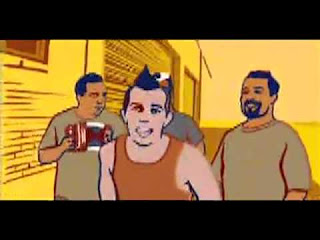Lesson Plan with Music Videos about Immigration

by Ann Abbott Again, I'm trying to vary the dynamic in my classroom as we head into the final weeks of the semester. So today in "Spanish in the Community" will be dedicated to music videos related to immigration--as long as enough students bring in smart phones or laptops. Step 1. I will set up five "stations"--one for each music video. The stations will include a copy of the lyrics, except for the mix. For the mix, I will ask students to jot down lyrics that they hear. "Clandestino" Manu Chao "Frijolero" Molotov (OJO: some strong language) "Mojado" Ricardo Arjona "Venezuelan en New York" King Chango Narco corridos mix, DJ Rojo Mix Step 2. The students will go to one of the five stations, and fill out the following information on a note card: Nombre de la canción y artista-grupo Un comentario sobre la letra. Un comentario sobre la música. Un comentario sobre las imágenes. Una pregunta. Estrellas-...


















